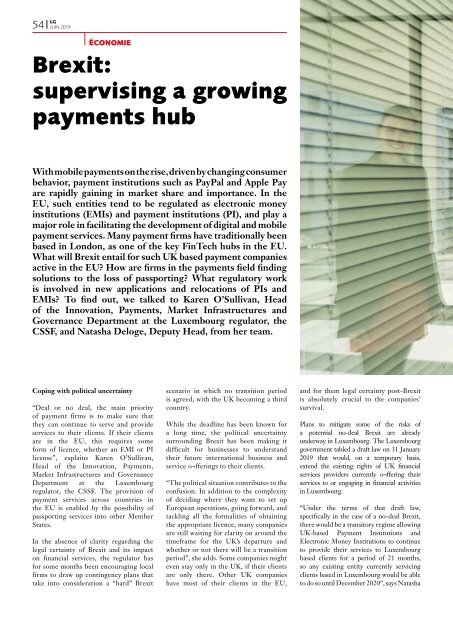LG 223
Create successful ePaper yourself
Turn your PDF publications into a flip-book with our unique Google optimized e-Paper software.
54 <strong>LG</strong><br />
JUIN 2019<br />
ÉCONOMIE<br />
Brexit:<br />
supervising a growing<br />
payments hub<br />
With mobile payments on the rise, driven by changing consumer<br />
behavior, payment institutions such as PayPal and Apple Pay<br />
are rapidly gaining in market share and importance. In the<br />
EU, such entities tend to be regulated as electronic money<br />
institutions (EMIs) and payment institutions (PI), and play a<br />
major role in facilitating the development of digital and mobile<br />
payment services. Many payment firms have traditionally been<br />
based in London, as one of the key FinTech hubs in the EU.<br />
What will Brexit entail for such UK based payment companies<br />
active in the EU? How are firms in the payments field finding<br />
solutions to the loss of passporting? What regulatory work<br />
is involved in new applications and relocations of PIs and<br />
EMIs? To find out, we talked to Karen O’Sullivan, Head<br />
of the Innovation, Payments, Market Infrastructures and<br />
Governance Department at the Luxembourg regulator, the<br />
CSSF, and Natasha Deloge, Deputy Head, from her team.<br />
Copyright: Mike Zenari<br />
Coping with political uncertainty<br />
“Deal or no deal, the main priority<br />
of payment firms is to make sure that<br />
they can continue to serve and provide<br />
services to their clients. If their clients<br />
are in the EU, this requires some<br />
form of licence, whether an EMI or PI<br />
license”, explains Karen O’Sullivan,<br />
Head of the Innovation, Payments,<br />
Market Infrastructures and Governance<br />
Department at the Luxembourg<br />
regulator, the CSSF. The provision of<br />
payment services across countries in<br />
the EU is enabled by the possibility of<br />
passporting services into other Member<br />
States.<br />
In the absence of clarity regarding the<br />
legal certainty of Brexit and its impact<br />
on financial services, the regulator has<br />
for some months been encouraging local<br />
firms to draw up contingency plans that<br />
take into consideration a “hard” Brexit<br />
scenario in which no transition period<br />
is agreed, with the UK becoming a third<br />
country.<br />
While the deadline has been known for<br />
a long time, the political uncertainty<br />
surrounding Brexit has been making it<br />
difficult for businesses to understand<br />
their future international business and<br />
service o¬fferings to their clients.<br />
“The political situation contributes to the<br />
confusion. In addition to the complexity<br />
of deciding where they want to set up<br />
European operations, going forward, and<br />
tackling all the formalities of obtaining<br />
the appropriate licence, many companies<br />
are still waiting for clarity on around the<br />
timeframe for the UK’s departure and<br />
whether or not there will be a transition<br />
period”, she adds. Some companies might<br />
even stay only in the UK, if their clients<br />
are only there. Other UK companies<br />
have most of their clients in the EU,<br />
and for them legal certainty post-Brexit<br />
is absolutely crucial to the companies’<br />
survival.<br />
Plans to mitigate some of the risks of<br />
a potential no-deal Brexit are already<br />
underway in Luxembourg. The Luxembourg<br />
government tabled a draft law on 31 January<br />
2019 that would, on a temporary basis,<br />
extend the existing rights of UK financial<br />
services providers currently o¬ffering their<br />
services to or engaging in financial activities<br />
in Luxembourg.<br />
“Under the terms of that draft law,<br />
specifically in the case of a no-deal Brexit,<br />
there would be a transitory regime allowing<br />
UK-based Payment Institutions and<br />
Electronic Money Institutions to continue<br />
to provide their services to Luxembourg<br />
based clients for a period of 21 months,<br />
so any existing entity currently servicing<br />
clients based in Luxembourg would be able<br />
to do so until December 2020”, says Natasha


















